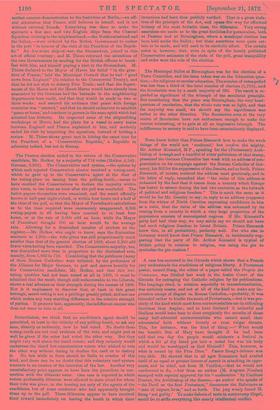The Preston election ended in the return of the Conservative
candidate, Mr. Holker, by a majority of 718 votes (Holker, 4,542 ; German, 3,824). The Conservative card system,—the system by which each reputed Conservative elector received a voting-card, which he gave up to the Conservative agent at the door of the voting-place on issuing from the polling-booth,—seems to have enabled the Conservatives to declare the majority within nine votes, in less than an hour after the poll was concluded. The ballot-papers themselves were examined, and the result officially known at half-past eight o'clock, or within four hours and a half of the close of the poll, so that the Mayor of Pontefract's calculations as to the time required were enormously exaggerated, 8,366 voting-papers in 1111 having been counted in at least four hours, or at the rate of 2,000 odd an hour, while the Mayor of Pontefract thought 700 an hour would be the average rate. Allowing for a diminished number of electors on the register,—Mr. Holker, who ought to know, says the diminution amounts to 1,300,—the vote given was still proportionally much smaller than that of the general election of 1868, about 2,200 odd fewer votes having been recorded. The Conservative majority, too, was diminished more than in proportion to the diminished vote, namely, from 1,062 to 718. Considering that the publicans (many of them Roman Catholics) were irritated, by the preference of the Alliance for Major German, to poll and canvas heartily for the Conservative candidate, Mr. Holker, and that this irri- tating question had not been raised at all in 1868, it must be admitted that the result, though still unfavourable to the Liberals, shows a real advance on their strength during the contest of 1868. Nor is it unpleasant to discover that, at least in this great borough, secret voting is not a privilege greatly prized, and not one which makes any very startling difference iu the relative strength of parties. It protects best, apparently, the indifferent elector who does not want to vote at all.


































 Previous page
Previous page